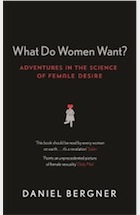I was on the Victoria line with my boyfriend, telling him about a new book by the American author Daniel Bergner, called What Do Women Want? Its headline, traffic-stopping message is that women, routinely portrayed as the monogamous sex, are actually not very well-suited to monogamy. In fact, far from being more faithful than men, we may actually be more naturally promiscuous – more bored by habituation, more voracious, more predatory, more likely to objectify a mate. The expectation upon us not to feel, still less exhibit, any of these traits causes us to bury them, Bergner argues, giving rise to two phenomena.
First, women experience a loss of interest in sex within a marriage – commonly ascribed to low libido, but actually more a thwarted libido. Bergner interviewed a number of women in long-term relationships, many of whom elaborated on this waning desire. One woman said of her husband, "We did have sex maybe once a week, but it didn't reach me. My body would respond, but the pleasure was like the pleasure of returning library books. And the thing about being repulsed by him was, I felt my body was a room that I didn't want to mess up. Unlike that openness at the beginning, when my body was a room and I didn't mind if he came in with his shoes on."
The second, and perhaps more surprising phenomenon, is that all this thwarted sexual energy, like anything suppressed, has its power redoubled, to become something violent and alarming, if for any reason the brakes come off.
I thought I'd illustrate this to my boyfriend using two of Bergner's stories about monkeys. The first tells us that, in scientific tests, women become aroused when they watch a film of two copulating bonobos (men don't, by the way), and that they strongly deny this arousal when asked. The explanation, proffered tentatively by Bergner, is that female sexuality is as raw and bestial as male sexuality. But, unlike men, our animal urges are stoutly denied, by society and by ourselves, so that when they surface, it is not as a manageable stream, but as a rushing torrent that will sweep up everything it passes, even a pair of shagging primates. Bergner goes on to quote a 42-year-old woman named Rebecca, who had a threesome after her husband left her, and who makes an observation about the nature of female desire that is both poetic and precise. "The phrase that keeps coming into my head is that it's like a pregnancy of wanting. Pregnancy's not a good word – because it means pregnancy. It's that it's always there. Or always ready. And so much can set it off. Things you actually want and things you don't. Pregnant. Full. The pregnancy of women's desire. That's the best I can do."
--------
Also read
What men don't get about women
-----
You need only look at
Fifty Shades Of Grey: at 5.3m copies, it is the biggest-selling book since UK records began. More than one in five British women owns a copy. On the basis that people lend things, let's say 10 million women have read it, or almost half Britain's adult female population.
People make arch remarks about how they wouldn't mind all the sex, if only it weren't so atrociously written. In fact, it's not badly written (the sequels are awful), but that's not the point. The story here is not the book, but the number of women who bought the book. For a period of time, when you got on a train, the carriage would be a third full of people reading erotica at 8.45 in the morning. Here were Bergner's raging waters of female sexuality that, once unstaunched, would tear everything up by the roots and sweep it along, from S&M to rape fantasies to love eggs. (Which, incidentally, nobody has got into because of the unsettling realisation – well documented on Mumsnet – that you can't tell they're there. "Is it me? Or the love egg? Should I have spent more than £7.99? Or is the problem my pelvic floor?" And so on.)
When people critique the book on literary grounds, or on the basis that it legitimises domestic abuse, they are wilfully stopping their ears to 10.6 million women's indomitable horniness. It makes them feel uncomfortable, squeamish. They could say, "Female sexuality makes me uncomfortable" but they don't. Instead, there is a snotty remark, a raised eyebrow. And this denial brings home the striking truth of Bergner's thesis: the shame that still attaches itself to female sexuality. These two hand grenades of his – that female sexuality is rigorously denied whenever it crops up; and that female sexual urges might be even more potent than men's – will not land lightly on this terrain.
To get back to Bergner's monkeys, he writes about the rhesus community at the
Emory University primate observatory, studied by psychologist
Kim Wallen. Bergner, a New York Times writer who has spent much of the past decade interviewing sex researchers and evaluating their work, discovered some surprising developments in the primate world. When I spoke to him, he explained how traditional theories of female passivity have been turned on their head: "With primatology, science has refused to see that females are the aggressors, the rulers, the initiators of sex. For so long, almost to a humorous extent, we have looked right past the truth; which is that the females are leaving their young, they're objectifying their mates, they're the agents of desire." He paused for a second, then added, almost exuberantly, "The psychologist had to keep getting rid of his male monkeys because the females got bored with them!"
By now we had pulled out of Stockwell station. My boyfriend was silent until we reached the next stop. "So, this piece about you wanting to have sex with a monkey – when's it running? Is it on our actual wedding day?"
"No. It is seven days before our wedding day."
A woman of 43, who has been married 10 years, told me, "Just before I married, I was reading an advice column in GQ. A guy had written in, saying, 'I'm about to get married. How do I face a lifetime of sex with the same person?' and the answer was, you'll get into panda/rabbit cycles. Sometimes you won't shag at all. Sometimes you'll shag all the time. I found the analogy depressing, as if getting married was like checking yourself into a zoo. Leaving the wilds, and choosing captivity."
I don't see marriage like that, but that's because I'm doing it in a different order. We've been together nine years and we have two children (five and three); they're the lock-in clause. I'm aware, nevertheless, of the asymmetry of expectation within a marriage, that husbands are meant to chafe at the bit, while wives are supposed not to notice it. It seems so obvious that this convention has built up to soothe male anxiety, I'm amazed by how surprised men are to find that it might not be true.
"Just a few days ago," Bergner tells me, "I had a male radio interviewer yelling at me on air. And when I finally had a finished manuscript, I gave it to a couple of married male friends, one of whom said, 'This is a cause for deep concern' and the other said, 'This scares the bejesus out of me.'" Well, yes; it is a little confronting, the idea that fidelity has no natural defender. "The level of self-delusion that we are capable of, here, especially men, is astonishing," the author laughs. I imagine it's like meeting your wife at 4am in the saloon bar of life. If you're here, who's minding the farm?
Bergner admits laconically, "There have been moments when I've looked over at my long-term girlfriend and thought, 'For how much longer am I going to be the recipient of your desire?'" Later, he paints a Woody Allenish picture of domestic neurosis. "Sure, we have conversations about it, as you can imagine. How can you not have this conversation, this exploration, constantly, with the person who's across from you at dinner and next to you in bed? But, no, I don't think she thinks of it as a threat. I think she laughs at me, because maybe she takes just a slight glimmer of pleasure in how threatened I feel."
We arrived at Pimlico and Yvette Cooper, the MP, got on and sat opposite us. We both looked at her intently, as she looked determinedly down. If you get any three women in conversation about the comprehensive spending review, they will, inevitably, arrive at the topic of whether or not they would do her husband, Ed Balls. So I was thinking the male equivalent of that line, "Behind every beautiful woman, there's a man who's bored with sleeping with her", wondering whether that's true of Cooper. Except, of course, that saying has no male equivalent. In the world in which such sayings are forged, women never get bored; only men get bored. Ergo, men have affairs and women simply lose that appetite. One of the questions Bergner poses is whether or not the search for female Viagra is really a quest for a medical solution to monogamy. Which is an amusing thought: we invent statins to counteract our fat-fuelled, sedentary lifestyles, and then aphrodisiacs to counteract our relationship choices, which, it turns out, we actually don't find very sexy.
There are obvious reasons for these choices, however: as Bergner points out, we are attached to monogamy as a way to hold families together, and women have become the main defenders of this social contract. "We are invested in women as mothers, and we value them as the backbone of our social structure. The maternal ideal is this indomitable force of stability that we can lean on. You know, it's the New York mayoral race at the moment.
Anthony Weiner, who was busy a year or so ago texting naked pictures of himself to women, had his career destroyed and is now back as the true challenger. We're not threatened by his anarchic, out-of-control sexuality. We can still conceive of him as a leader. But it's hard to imagine a woman having gone through that being able to make a comeback so quickly. The comparable woman we can't be happy with, because of that idea of woman as backbone, woman as someone to lean on and, finally, woman as mother."
Women have collaborated with, even driven, this narrative. Speaking personally, femininity has never held any interest for me; I have never wanted to be restrained, or discerning, or sober, or conciliatory, or mysterious, or small. But if anyone assumed that I would put my sexual gratification before my children, that I would do any of those things that men do – leave my family and start a new one – I would be mortified. Furious.
It is not easy to take apart or let go of that central maternal idea, in which women subordinate themselves entirely to their children; you can't just fit into this picture a sexual appetite as potent and heedless and devil-may-care as a man's. You have to rip up the whole picture and start again.
The funny thing is, in every conversation I've had with friends about sex, every woman I know has said, not proudly but quizzically, "I think I'm more like a man" or some variation of this. I don't think any of them would buy for a second the idea that women need more emotional connection to have sex, or that women don't objectify people's bodies, or that women wouldn't want a one-night stand. But, on some level, we have been conditioned to believe that the "try anything once" gene – the urge to sleep with everyone, just to see what happens – doesn't exist for women. This idea of women as innately discriminating, not necessarily averse to sex with strangers, but surely too picky to choose a stranger purely for his or her unfamiliarity, this idea of the female as the
gender that doesn't think about sex every seven minutes, has permeated the cultural groundwater completely. It's plainly rubbish, but it's tenacious, because women who don't conform to expectations of womanly choosiness, who are rapacious, assume they have some male trait they weren't supposed to have. It blows my mind a little bit that we never said, "Hang on, if you're like a man, and I'm like a man, is it possible that we're all just like men?"
We got off the train at King's Cross. He (my boyfriend) said, "You couldn't run it six weeks after the wedding?"
"Not really. But it's nice that you think only the wedding is jeopardised by me wanting to have sex with a monkey, and not the marriage itself."
He shrugged. "Where are you going to meet a monkey?" •





 The computer screen displays the 'online personals and casual encounters' website of Asley Madison (Getty)
The computer screen displays the 'online personals and casual encounters' website of Asley Madison (Getty)


